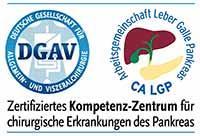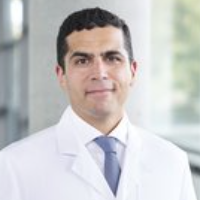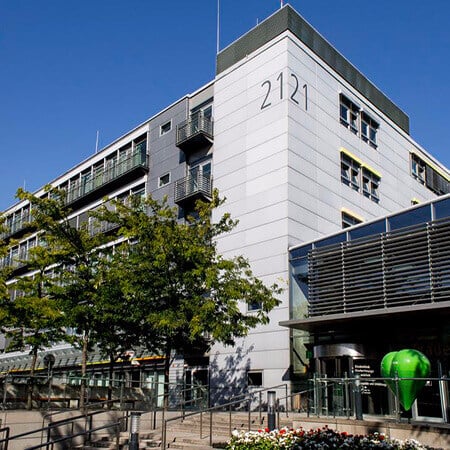Treatment of Duodenal Cancer with CRS and HIPEC - hyperthermic intraperitoneal chemotherapy
Treatment prices are regulated by national law of the corresponding countries, but can also include additional hospital coefficients. In order to receive the individual cost calculation, please send us the request and medical records.

Department of General, Abdominal, Transplant, Hepatopancreatobiliary, Colorectal, Endocrine, Bariatric Surgery and Hernia Surgery
The Department of General, Abdominal, Transplant, Hepatopancreatobiliary, Colorectal, Endocrine, Bariatric Surgery and Hernia Surgery provides the full range of services in the areas of its specialization and holds a leading position at the national and international levels in terms of the number of surgical interventions performed and their success. Of particular interest are operations for treating diseases of the bowel, stomach, esophagus, pancreas, liver, gallbladder, and bile ducts, and endocrine glands. The department's doctors have excellent skills in the surgical treatment of cancer, surgery for liver, kidney, pancreas, and small intestine transplants, and operations for morbid obesity. The department's operating rooms are the pride of the medical facility, since they have all the necessary technical options for performing operations with the da Vinci surgical system, image-guided interventions, and endoscopic surgical procedures, which are characterized by minimal trauma rates.







Department of General and Abdominal Surgery, Hepatopancreatobiliary Surgery, Colorectal Surgery, Endocrine Surgery, Hernia Surgery and Bariatric Surgery
The Department of General and Abdominal Surgery, Hepatopancreatobiliary Surgery, Colorectal Surgery, Endocrine Surgery, Hernia Surgery and Bariatric Surgery offers the full range of effective surgical treatments in accordance with modern medical standards. Operations of varying complexity are performed on the stomach, colon, pancreas, liver, gallbladder, bile ducts, rectum, thyroid gland, and parathyroid glands in the department's operating rooms every day. The department's primary focus is the surgical treatment of malignant gastrointestinal tumors. The medical facility is certified in this area by the German Cancer Society (DKG). The team of endocrine surgeons specializes in the treatment of diseases of the thyroid gland, parathyroid glands, and adrenal glands. Patients with morbid obesity are also successfully operated on here. In their work, the department’s specialists primarily use minimally invasive surgical techniques, which virtually eliminate trauma to healthy tissue during the intervention. The department's operating suite is equipped with an innovative da Vinci Surgical System, which allows the doctors to perform sparing and high-precision surgical interventions. The specialists of the medical facility strictly adhere to hygiene and safety standards and create the most comfortable conditions for each patient during their hospital stays.







Department of Abdominal and Colorectal Surgery, Hepatobiliary Surgery, Hernia Surgery, Bariatric Surgery, Endocrine Surgery, Thoracic and Vascular Surgery
The Department of Abdominal and Colorectal Surgery, Hepatobiliary Surgery, Hernia Surgery, Bariatric Surgery, Endocrine Surgery, Thoracic and Vascular Surgery offers the full range of services in these medical fields. It provides surgical treatment of diseases of the gastrointestinal tract, thyroid and parathyroid glands, thoracic organs, vascular system, rectum, anus and colon. In addition, the department performs bariatric interventions for the treatment of morbid obesity. A special focus is made on the treatment of gastrointestinal cancer. Minimally invasive surgical techniques are always preferred, if clinically indicated. The team of the department's surgeons has 8 progressive operating rooms equipped with everything necessary for successful treatment. The department also has the da Vinci Xi surgical system for high-precision minimally invasive robot-assisted interventions. The patient's health is in the safe hands of the best German surgeons who have gone through a rigorous selection and have vast clinical experience.






Few decades ago, a diagnosis of duodenal cancer was a sentence that was not subject to appeal. Today in the field of surgical oncology it is possible to cure more than 80% of cases of duodenal cancer. Cytoreductive surgeries and hyperthermic intraperitoneal chemoperfusion are indicated to patients with advanced duodenal cancer, with peritoneal metastases.
Content
- Duodenal cancer overview
- Symptoms
- Treatment
- Where can I undergo duodenal cancer treatment with HIPEC abroad?
- The cost of treatment
- How can I undergo duodenal cancer treatment with HIPEC abroad?
CRS, cytoreductive surgery, is the removal of duodenal tumor and the affected lymph nodes, and resection of the abdominal and pelvic organs affected by the cancer.
HIPEC, hyperthermic intraperitoneal chemotherapy, includes pumping a heated solution with a high concentration of chemotherapy drugs into the abdomen. HIPEC is performed immediately after CRS, to destroy micrometastases.
Specialized clinics for the treatment of duodenal cancer include the University Hospital of Ludwig Maximilian University of Munich, the Charite University Hospital Berlin, and the University Hospital Ulm.
For information and an initial consultation with a doctor, please leave a request on the Booking Health website. You will be contacted within 24 hours.
The cost of CRS and HIPEC ranges from 52,000 euros to 91,000 euros. On the Booking Health website you will find current prices for duodenal cancer treatment in different medical centers.
Duodenal cancer overview
The duodenum is a part of the small intestine that has secretory and motor functions. This organ plays a significant role in the digestion process, bringing food coming from the stomach to an alkaline reaction that is optimal for the further digestion process. Depending on the food composition, it regulates the secretion of pancreatic and bile enzymes.
Duodenal cancer often develops in people over the age of 50 and is characterized by slow tumor growth.
Until now, the causes of cancer of the duodenum has not been established, but risk factors have been identified and currently include hereditary predisposition, diabetes mellitus, polyps in the large intestine, gallstones, chronic pancreatitis, and Crohn’s disease.
A connection of the cancer development with the Helicobacter pylori infection is also suggested. Bacterium-associated ulcers in the duodenum are more common (eight out of ten cases), while in the stomach they are present only in six patients out of ten cases. Peptic ulcer disease four times more often affects the duodenal mucosa than the stomach one. Mostly women suffer from duodenal ulcers, and men suffer from stomach ulcers. However, no connection was found between duodenal ulcer and the occurrence of duodenal cancer. Although, the connection of duodenal cancer with obesity has been noticed.
The possible causes of duodenal cancer are associated with an improper lifestyle. These are the consumption of alcohol and fatty foods, insufficient consumption of vegetables and fruits, and smoking.
Symptoms
Symptoms of early duodenal cancer do not differ from those of any other gastric disease and include:
- Discomfort in the duodenum area
- Pain in the epigastric region unrelated to food intake
- Nausea
- Periodic flatulence
Usually, patients with various types of indigestion consider these symptoms as an exacerbation of chronic gastritis, colitis, or peptic ulcer disease, but not a malignant tumor.
Clinical manifestations of duodenal cancer in most cases are caused by narrowing of the intestinal lumen:
- With the localization of the tumor in the first section of the duodenum, the symptoms of stenosis may be present
- When the duodenal tumor is located in the descending part, the first symptom may be obstructive jaundice due to blockage of the bile outflow; clinical signs of acute pancreatitis may be present
- In case of cancer in the lower part of the duodenum, intestinal obstruction can develop (a progressively worsening condition with intoxication)
- Growing of the tumor through the intestinal wall may cause presence of blood in the stool
- Involvement of the pancreas is manifested by severe pain syndrome, similar to the symptoms of acute pancreatitis
- At the metastatic stage of duodenal cancer, symptoms reflect the localization of foci in organs and tissues with progressive weight loss and increasing weakness
The vast majority of patients are under 50, although statistical information on duodenal cancer is somehow limited.
For duodenal cancer diagnosis, the esophagogastroduodenoscopy or EGD is used. During EGD, the organ is examined, and a biopsy is taken from pathological or suspicious areas. X-ray examination in different projections is also effective for diagnosis making.
Treatment
Unfortunately, surgery for the treatment of primary tumors and metastases in the abdominal cavity is not considered an efficient method in surgical oncology. Even the best surgeon can remove only those neoplasms that are visible or detectable. At the same time, metastases still remain, which means that the cancer is going to return.
Treatment with conventional chemotherapy is also ineffective in this case since it has little effect on primary and secondary tumors of the abdominal cavity. That is why hyperthermic intraperitoneal chemotherapy HIPEC is so important.
A team of doctors specializing in surgical oncology, which necessarily includes a surgeon and an oncologist specializing in the treatment of gastrointestinal cancer, decides if the patient is eligible for the HIPEC method. The presence of different specialists provides a comprehensive, individual approach not only during HIPEC but also at all stages of treatment and rehabilitation.
Cancer treatment with HIPEC is usually performed at the end of the surgery. Before the surgery, the patient must undergo all the necessary examinations: CT scan, colonoscopy, blood tests, etc.
The surgery begins with an examination of the abdominal and pelvic organs. The surgeon carefully removes all detected malignant formations. This surgery is called "cytoreductive surgery", and it requires competence and experience in surgical oncology. The operation to remove cancer cells from the abdominal cavity is quite difficult. The whole process of surgical intervention together with HIPEC can last about 16 hours, and the HIPEC procedure itself takes from 30 minutes to 90 minutes.
After making sure that there are no more visible tumors, the doctors begin the HIPEC chemotherapy session. If reconstructive surgery is required, such as stoma placement, etc., it can be performed either before or after "heated" chemotherapy.
HIPEC chemotherapy is performed in combination with surgical removal of the abdominal tumor. During cytoreductive surgery, the peritoneal cavity is carefully examined and all visible pathological foci (larger than 1-2 millimeters in size) are removed. After resection of the tumor, chemotherapy drugs are heated to a temperature of 42-43 degrees Celsius and are injected into the abdominal cavity through a catheter. The volume, flow rate, and temperature of the solution are constantly monitored using sensors and other medical devices. The devices constantly measure the temperature and pressure inside the abdominal cavity and automatically correct the parameters if they deviate from the norm.
The HIPEC treatment lasts on average about 1,5 hours. After the procedure, the solution is removed completely. Then the integrity of the surgical area is restored (if possible) and all incisions are sutured. The patient is transferred to an intensive care unit for a while.
As a rule, HIPEC is used to treat advanced cancer and makes it possible to destroy atypical cells and metastases. At the same time, in different cases in surgical oncology, the results of using the procedure differ. For example, HIPEC is successfully treating 50% of cases of ovarian cancer and 90% of cases of peritoneal pseudomyxoma.
Hyperthermic intraperitoneal chemotherapy (HIPEC) is contraindicated in the presence of massive adhesions in the abdominal cavity and severe cardiovascular diseases. Also, the procedure cannot be carried out in case of inflammatory processes in this area and after extensive surgical interventions. As a rule, chemotherapy HIPEC has no significant side effects. The severity of intoxication depends on the general health condition of the patient. The most common complications of the procedure are vomiting, nausea, weakness, and pain in the abdomen.
As the chemotherapy drugs practically do not enter the bloodstream, they do not cause intoxication. Therefore, in case of following rules of preparation for the procedure, as well as choosing the correct dose of the drug and the technique, the patient requires no special rehabilitation. It is enough to adhere to the rules of postoperative patient care and follow the recommendations of the attending physician.
Where can I undergo duodenal cancer treatment with HIPEC abroad?
Health tourism is becoming more and more popular these days, as duodenal cancer is successfully being treated with HIPEC abroad.
The following hospitals show the best success rates in duodenal cancer treatment with HIPEC:
- University Hospital of Ludwig Maximilian University of Munich, Germany
- Charite University Hospital Berlin, Germany
- University Hospital Ulm, Germany
- Tel Aviv Sourasky Medical Center, Israel
- University Hospital Carl Gustav Carus Dresden, Germany
You can find more information for understanding HIPEC and finding the specialized hospitals on the Booking Health website.
The cost of treatment
The prices in hospitals listed on the Booking Health website are relatively low. With Booking Health, you can undergo duodenal cancer treatment with HIPEC abroad at an affordable price.
The cost of HIPEC ranges from €52.241 to €91.985 and depends on the type of cancer, the extent to which it has spread and the level of the hospital.
You also need to consider the cost of possible additional procedures and follow-up care. Therefore, the final cost of treatment may differ from the initial price.
To make sure that the overall cost of treatment is suitable for you, contact us by leaving the request on the Booking Health website.
How can I undergo duodenal cancer treatment with HIPEC abroad?
It is not easy to self-organize any treatment abroad. It requires certain knowledge and expertise. Thus, it is safer, easier, and less stressful to shift some responsibility onto a medical tourism agency.
As the largest and most transparent medical tourism agency in the world, Booking Health has up-to-date information about duodenal cancer treatment with HIPEC in the best hospitals in the world. Therefore, we will help you select the right clinic taking into account your wishes for treatment.
We want to help you and take on all the troubles. You can be free of unnecessary stress, while Booking Health takes care of all organizational issues regarding the treatment. Our services are aimed at undergoing duodenal cancer treatment with HIPEC safely and successfully.
Medical tourism can be easy! All you need to do is to leave a request on the Booking Health website, and our manager will contact you shortly.
Authors:
The article was edited by medical experts, board-certified doctors Dr. Vadim Zhiliuk and Dr. Nadezhda Ivanisova. For the treatment of the conditions referred to in the article, you must consult a doctor; the information in the article is not intended for self-medication!
Sources:

